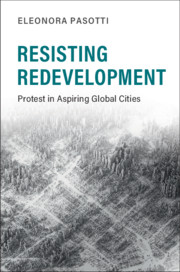Book contents
- Resisting Redevelopment
- Cambridge Studies in Contentious Politics
- Resisting Redevelopment
- Copyright page
- Dedication
- Contents
- Illustrations
- Acknowledgments
- Part I Setting the Comparison
- Part II Explaining Mobilization
- 5 Experiential Tools and Networks
- 6 Squatting, Experiential Tools, and Protest Legacies
- 7 Judicial Resistance, Experiential Tools, and Protest Legacies
- 8 Protest with High Union Support
- Part III Explaining Impact
- Book part
- Bibliography
- Index
- Cambridge Studies in Contentious Politics
5 - Experiential Tools and Networks
from Part II - Explaining Mobilization
Published online by Cambridge University Press: 09 March 2020
- Resisting Redevelopment
- Cambridge Studies in Contentious Politics
- Resisting Redevelopment
- Copyright page
- Dedication
- Contents
- Illustrations
- Acknowledgments
- Part I Setting the Comparison
- Part II Explaining Mobilization
- 5 Experiential Tools and Networks
- 6 Squatting, Experiential Tools, and Protest Legacies
- 7 Judicial Resistance, Experiential Tools, and Protest Legacies
- 8 Protest with High Union Support
- Part III Explaining Impact
- Book part
- Bibliography
- Index
- Cambridge Studies in Contentious Politics
Summary
Chapter 5 analyzes cases featuring a combination of experiential tools and networks. It examines Santiago, where despite an especially adverse institutional context, protesters from the neighorhood of Yungay were able to succeed thanks to an extensive deployment of experiential tools and networks. It examines in detail the multifaceted approach they used and the different types of experiential tools, with special attention to events and archives. The chapter also reviews a second case in Santiago, in the area of Colina, where protesters emulated the strategies developed in Yungay to great effect. The chapter reviews two cases of weak mobilization in Istanbul: Sulukule and Fener & Balat, where networks were fragmented and therefore mobilization was weak. It then hones in on cases in which the deployment of experiential tools and networks led instead to mass mobilizations: in Istanbul with Gezi Park and in Tel Aviv with encampments against gentrification that prompted the largest protest in the country's history. The chapter concludes by examining the institutional, ethnic, and social features that undermine mobilization in the Jaffa neighborhood of Tel Aviv.
Keywords
Information
- Type
- Chapter
- Information
- Resisting RedevelopmentProtest in Aspiring Global Cities, pp. 101 - 138Publisher: Cambridge University PressPrint publication year: 2020
